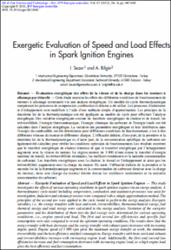Exergetic Evaluation of Speed and Load Effects in Spark Ignition Engines
Erişim
info:eu-repo/semantics/openAccessTarih
2012Erişim
info:eu-repo/semantics/openAccessÜst veri
Tüm öğe kaydını gösterÖzet
Exergetic Evaluation of Speed and Load Effects in Spark Ignition Engines This study investigates the effects of various operating conditions in spark ignition engines via an exergy analysis. A thermodynamic cycle model including compression, combustion and expansion processes was used for investigation. Induction and exhaust processes were computed with a simple approximation method. The principles of the second law were applied to the cycle model to perform the exergy analysis. Exergetic variables, i.e., the exergy transfers with heat and work, irreversibilities, thermomechanical exergy, filet chemical exergy and total exergy were calculated in the exergy analysis. Variation of the exergetic parameters and the distribution of them into the fuel exergy were determined for various operating conditions, i.e., engine speed and load. The first and second law efficiencies and specific fuel consumption were also computed to reveal the optimum operating conditions. The results show that the exergy transfer with heat decreases and the exergy transfer with exhaust gases increases with increasing engine speed. Engine speed of 3 000 rpm gives the maximum exergy transfer as work, the minimum irreversibility and the best efficiency and fuel consumption. Exergy transfers with heat, work and exhaust and irreversibilities increase with increasing engine load. Additionally, the first and second law efficiencies increase and fuel consumption decreases with increasing engine load, so a high engine load gives the best efficiency and fuel consumption.


















